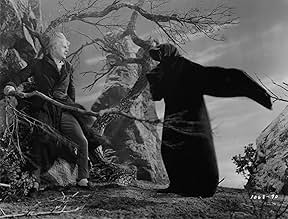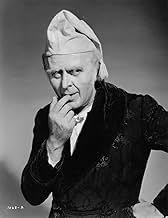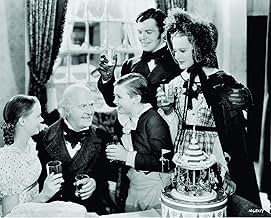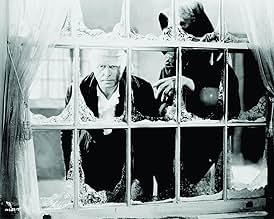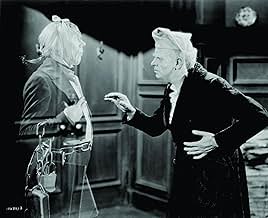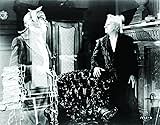- Awards
- 1 win total
Barry MacKay
- Fred
- (as Barry Mackay)
Bunny Beatty
- Martha Cratchit
- (uncredited)
Billy Bevan
- Street Watch Leader
- (uncredited)
Ted Billings
- Man on Sidewalk
- (uncredited)
Matthew Boulton
- Second Charity Solicitor
- (uncredited)
- Director
- Writers
- All cast & crew
- Production, box office & more at IMDbPro
7.59.6K
1
2
3
4
5
6
7
8
9
10
Featured reviews
One of the Most Beautiful Christmas Tales
In the Nineteenth Century, in London, the bitter, greedy and cranky Ebenezer Scrooge (Reginald Owen) hates Christmas and people. He runs his business exploiting his employee Bob Cratchit (Gene Lockhart) and spends unfriendly treatment to his nephew Fred (Barry MacKay) and acquaintances.
In the Christmas Eve, he is visited by the doomed chained ghost of his former partner Jacob Marley (Leo G. Carroll), who died seven years ago and tells him that three spirits would visit him that night. The first one, the spirit of past Christmas, recalls his happy childhood and coming of age; the spirit of the present Christmas shows him the poor situation of Bob's family and the happiness of Fred and his fiancée Bessy; and the spirit of future Christmas shows his fate. Scrooge finds that life is good and finds redemption changing thoughts about Christmas, Bob, tiny Tim, his nephew and people in general.
"A Christmas Carol" is one of the most beautiful Christmas tales in the cinema. I do not recall how many adaptations of one of the most known Charles Dickens' short story I have seen but this 1938 is also wonderful. I do not have much more to say but recommend this magnificent family entertainment. My vote is eight.
Title (Brazil): "Um Conto de Natal" ("A Christmas Tale")
In the Christmas Eve, he is visited by the doomed chained ghost of his former partner Jacob Marley (Leo G. Carroll), who died seven years ago and tells him that three spirits would visit him that night. The first one, the spirit of past Christmas, recalls his happy childhood and coming of age; the spirit of the present Christmas shows him the poor situation of Bob's family and the happiness of Fred and his fiancée Bessy; and the spirit of future Christmas shows his fate. Scrooge finds that life is good and finds redemption changing thoughts about Christmas, Bob, tiny Tim, his nephew and people in general.
"A Christmas Carol" is one of the most beautiful Christmas tales in the cinema. I do not recall how many adaptations of one of the most known Charles Dickens' short story I have seen but this 1938 is also wonderful. I do not have much more to say but recommend this magnificent family entertainment. My vote is eight.
Title (Brazil): "Um Conto de Natal" ("A Christmas Tale")
Entertaining version, though not faithful to novel
We are tremendous enthusiasts of A Christmas Carol in our household and watch virtually all the versions each Christmas, including the modern 1984 George C. Scott and the 1999 Patrick Stewart. Our overall favorite, however, is the 1951 black & white classic with Alastair Sim, who absolutely IS Ebeneezer Scrooge, his conversion ringing the truest. (See my comments on these other films, if interested) This older 1938 version makes a delightful story with a fine, though Hollywood generated, atmosphere. Of course one could never expect in those days to see all the location filming or special effects available today.
Reginald Owen, with his stooped figure and awkward gait, makes a likely looking Scrooge. My main problem with this movie is that he simply repents far too early. Before the Spirit of Christmas Past has taken leave, this Scrooge regrets his past miserliness and is ready to give generously & make merry. What is the point of the other two Spirits?
In addition to Scrooge's totally premature conversion, however, this movie takes far too many liberties with the novel. To name but a few... First, during Marley's ghostly visit, Scrooge summons to his chambers a trio of police officers from the street below his window. Not only is this unfaithful to the book, but totally destroys the ghostly, eerie, haunted atmosphere of the spectre's visit and poor Scrooge's resulting terror.
This adaptation makes no mention whatsoever of the young apprentice Scrooge's sweetheart, Belle, or his tragically failed romance. It does depict his sister, Fan, as younger, in keeping with the novel ...unlike most versions, which erroneously portray her as older, and claim that Scrooge's mother died in childbirth when he was born. However, Fan is, frankly, an annoying little chatterbox here!
The nephew, Fred, is supposed to be married, but in this tale he is engaged to Bess, their marriage apparently contingent on an improvement in his financial prospects. Lots of fabricated scenes, with the pair sliding in front of a church. However, I can forgive all this as Fred is wonderfully jolly & hearty, true to the book. In fact, he's one of the best Freds.
Bob Cratchit is jolly & likable but a wee bit too plump for the role of the poor clerk! Also, there's a fabricated story here in which Scrooge sacks Bob altogether. Tiny Tim is cute but far too old for the role; he's practically as tall as his father. Mrs. Cratchit is convincing, except that she is actually the one who proposes a toast to Scrooge after their Christmas dinner...quite the opposite of the novel's Mrs. Cratchit, who must be coaxed and cajoled by Bob before deigning to lift her glass to the health of her long-suffering husband's oppressive, stingy employer. That being said, otherwise it's one of the better versions of the Cratchit family's dinner, the goose & pudding scenes all beautifully done.
The worst offense is a complete elimination of the 'morning after Christmas' office scene, in which Scrooge normally shows his newfound benevolence to the flabbergasted Bob. This is usually my favorite scene in the entire movie. In this version, Scrooge actually delivers his Christmas turkey to the Cratchits personally himself on Christmas Day, with nephew, Fred, and his fiancée, Bess, both in tow.
However, the Spirits are well depicted, Christmas Past a beautiful & ethereal young lady, Christmas Present a hearty & benevolent giant (who sprinkles from his torch the essence of Christmas cheer five times distilled), and Christmas Yet To Come the typical darkly shrouded & foreboding figure. It's all well intended and difficult to really ruin this wonderful story. For all its omissions, embellishments, and deviations, it still makes for entertaining and heartwarming holiday viewing.
Reginald Owen, with his stooped figure and awkward gait, makes a likely looking Scrooge. My main problem with this movie is that he simply repents far too early. Before the Spirit of Christmas Past has taken leave, this Scrooge regrets his past miserliness and is ready to give generously & make merry. What is the point of the other two Spirits?
In addition to Scrooge's totally premature conversion, however, this movie takes far too many liberties with the novel. To name but a few... First, during Marley's ghostly visit, Scrooge summons to his chambers a trio of police officers from the street below his window. Not only is this unfaithful to the book, but totally destroys the ghostly, eerie, haunted atmosphere of the spectre's visit and poor Scrooge's resulting terror.
This adaptation makes no mention whatsoever of the young apprentice Scrooge's sweetheart, Belle, or his tragically failed romance. It does depict his sister, Fan, as younger, in keeping with the novel ...unlike most versions, which erroneously portray her as older, and claim that Scrooge's mother died in childbirth when he was born. However, Fan is, frankly, an annoying little chatterbox here!
The nephew, Fred, is supposed to be married, but in this tale he is engaged to Bess, their marriage apparently contingent on an improvement in his financial prospects. Lots of fabricated scenes, with the pair sliding in front of a church. However, I can forgive all this as Fred is wonderfully jolly & hearty, true to the book. In fact, he's one of the best Freds.
Bob Cratchit is jolly & likable but a wee bit too plump for the role of the poor clerk! Also, there's a fabricated story here in which Scrooge sacks Bob altogether. Tiny Tim is cute but far too old for the role; he's practically as tall as his father. Mrs. Cratchit is convincing, except that she is actually the one who proposes a toast to Scrooge after their Christmas dinner...quite the opposite of the novel's Mrs. Cratchit, who must be coaxed and cajoled by Bob before deigning to lift her glass to the health of her long-suffering husband's oppressive, stingy employer. That being said, otherwise it's one of the better versions of the Cratchit family's dinner, the goose & pudding scenes all beautifully done.
The worst offense is a complete elimination of the 'morning after Christmas' office scene, in which Scrooge normally shows his newfound benevolence to the flabbergasted Bob. This is usually my favorite scene in the entire movie. In this version, Scrooge actually delivers his Christmas turkey to the Cratchits personally himself on Christmas Day, with nephew, Fred, and his fiancée, Bess, both in tow.
However, the Spirits are well depicted, Christmas Past a beautiful & ethereal young lady, Christmas Present a hearty & benevolent giant (who sprinkles from his torch the essence of Christmas cheer five times distilled), and Christmas Yet To Come the typical darkly shrouded & foreboding figure. It's all well intended and difficult to really ruin this wonderful story. For all its omissions, embellishments, and deviations, it still makes for entertaining and heartwarming holiday viewing.
My favorite version...my favorite Christmas movie!
There's just something about this one that, while not close to being the most faithful it nonetheless remains my favorite of all the many film versions of Dicken's Christmas Carol.
I guess it's those old classic MGM production values. It's Gene Lockhart's sometimes cowed, sometimes impish, sometimes heroic & joy-filled Bob Cratchett.
And it's definitely the way Reginald Owen turns Scrooge around far earlier than the other productions. I get so tired of seeing that rotten old Scrooge stay rotten until ten minutes before the film ends, when, poof, he sees the light & is miraculously transformed form the meanest man in the world to the nicest. Here, Owen's Scrooge begins to turn fairly quick, and I enjoy that - it really makes him so much easier to root for.
Every time I see it I'm reminded about how marvelous & truly important Franz Waxman's score is to this version. It's delightfully bouncy & upbeat when it's called for & dark forboding during the grim scenes. It's wonderful; dead-on perfect.
For me, it's far and away the most entertaining version. Sit back for its brief 69 minutes, watch and enjoy.
I guess it's those old classic MGM production values. It's Gene Lockhart's sometimes cowed, sometimes impish, sometimes heroic & joy-filled Bob Cratchett.
And it's definitely the way Reginald Owen turns Scrooge around far earlier than the other productions. I get so tired of seeing that rotten old Scrooge stay rotten until ten minutes before the film ends, when, poof, he sees the light & is miraculously transformed form the meanest man in the world to the nicest. Here, Owen's Scrooge begins to turn fairly quick, and I enjoy that - it really makes him so much easier to root for.
Every time I see it I'm reminded about how marvelous & truly important Franz Waxman's score is to this version. It's delightfully bouncy & upbeat when it's called for & dark forboding during the grim scenes. It's wonderful; dead-on perfect.
For me, it's far and away the most entertaining version. Sit back for its brief 69 minutes, watch and enjoy.
A Triumph For Reginald Owen
The wretched life of a disagreeable old man is forever altered one haunted Christmas Eve...
Charles Dickens' wonderful Yuletide story, A CHRISTMAS CAROL, is given the full MGM deluxe treatment in this superior Holiday film. The production values & acting are both excellent, with just enough sentiment to appeal to the tenderhearted, and with liberal doses of horror & hilarity stirred into the mix, until, like a fine Christmas punch, the result appeals to all.
The film's rather short running time keeps the action moving along briskly, with one famous & beloved episode after another coming alive before the viewer's eyes.
Reginald Owen, in his best film role, is perfect as the grasping, clutching, tightfisted, covetous old sinner, Ebenezer Scrooge. Replacing the ailing - and highly respected - Lionel Barrymore, Owen makes the part his own, revealing the old miser's misery & heartache, making the part thoroughly human. When he rejoices in his spiritual regeneration at the climax, so do we.
The roles of Bob Cratchit, Scrooge's amiable clerk & Fred, Scrooge's friendly nephew, are both fleshed out more fully than in other versions. The acting skills of Gene Lockhart & Barry MacKay turn them into something very memorable.
Special mention should also be made of Leo G. Carroll as Marley's morose Ghost; Lionel Braham as an impressively jolly Ghost of Christmas Present; and Kathleen Lockhart & Terry Kilburn as Mrs. Cratchit & Tiny Tim. All add fine brushstrokes to the overall picture.
Movie mavens will recognize Billy Bevan as an officer of the Watch; Forrester Harvey as an ebullient Fezziwig; Halliwell Hobbes as a jolly Vicar; and young June Lockhart, in her film debut, as Belinda Cratchit - all uncredited.
Charles Dickens' wonderful Yuletide story, A CHRISTMAS CAROL, is given the full MGM deluxe treatment in this superior Holiday film. The production values & acting are both excellent, with just enough sentiment to appeal to the tenderhearted, and with liberal doses of horror & hilarity stirred into the mix, until, like a fine Christmas punch, the result appeals to all.
The film's rather short running time keeps the action moving along briskly, with one famous & beloved episode after another coming alive before the viewer's eyes.
Reginald Owen, in his best film role, is perfect as the grasping, clutching, tightfisted, covetous old sinner, Ebenezer Scrooge. Replacing the ailing - and highly respected - Lionel Barrymore, Owen makes the part his own, revealing the old miser's misery & heartache, making the part thoroughly human. When he rejoices in his spiritual regeneration at the climax, so do we.
The roles of Bob Cratchit, Scrooge's amiable clerk & Fred, Scrooge's friendly nephew, are both fleshed out more fully than in other versions. The acting skills of Gene Lockhart & Barry MacKay turn them into something very memorable.
Special mention should also be made of Leo G. Carroll as Marley's morose Ghost; Lionel Braham as an impressively jolly Ghost of Christmas Present; and Kathleen Lockhart & Terry Kilburn as Mrs. Cratchit & Tiny Tim. All add fine brushstrokes to the overall picture.
Movie mavens will recognize Billy Bevan as an officer of the Watch; Forrester Harvey as an ebullient Fezziwig; Halliwell Hobbes as a jolly Vicar; and young June Lockhart, in her film debut, as Belinda Cratchit - all uncredited.
"What's Christmas without chestnuts?" and Christmas Carol
I would like to say that every version of Dickens' tale is excellent in its own way but that would include Henry Winkler's "American Christmas Carol" and "Mr Magoo's Christmas Carol". Of course, then there's Albert Finney's musical "Scrooge" - Thank you very much.
But, rather than quibble about which is the best version, I will say that Dickens' story is the best illustration of the Christmas essence. Religion and commercialism aside, Christmas is about giving to mankind to better yourself and Scrooge is the poster child of that sentiment.
Now, as to Reginald Owens' version of the tale, just a couple of quick points:
This film is lighter and brighter than the others. The Lockharts are almost "cartoonish" in their portrayals. There is a cuteness in this one that makes it a bit more fitting for small children than the Sim/Scott/Stewart versions. Nephew Fred(Barry MacKay)is infectiously good natured and a fitting opposite for Owens' mean, old Scrooge.
As to Reginald Owens, his meanness is nowhere near the other Scrooge's but his character fits the overall nature of the film. I just wish that they would have tried harder with his facial makeup. In some of the scenes, he looks an awful lot like the scarecrow in "Wizard of Oz".
This version may be "A Christmas Carol Lite" but it is very watchable and entertaining.
"God Bless Us, Everyone."
But, rather than quibble about which is the best version, I will say that Dickens' story is the best illustration of the Christmas essence. Religion and commercialism aside, Christmas is about giving to mankind to better yourself and Scrooge is the poster child of that sentiment.
Now, as to Reginald Owens' version of the tale, just a couple of quick points:
This film is lighter and brighter than the others. The Lockharts are almost "cartoonish" in their portrayals. There is a cuteness in this one that makes it a bit more fitting for small children than the Sim/Scott/Stewart versions. Nephew Fred(Barry MacKay)is infectiously good natured and a fitting opposite for Owens' mean, old Scrooge.
As to Reginald Owens, his meanness is nowhere near the other Scrooge's but his character fits the overall nature of the film. I just wish that they would have tried harder with his facial makeup. In some of the scenes, he looks an awful lot like the scarecrow in "Wizard of Oz".
This version may be "A Christmas Carol Lite" but it is very watchable and entertaining.
"God Bless Us, Everyone."
Did you know
- TriviaThis was the only film in which Gene Lockhart appeared with his wife Kathleen Lockhart and their daughter June Lockhart.
- GoofsAt school, young Ebenezer mistakenly calls his sister Fran. Her real first name is Fan.
- Quotes
Ebenezer Scrooge: [to Marley's ghost] We'll soon see how real you are.
[Calling out the window]
Ebenezer Scrooge: Watch! There's an intruder in my room!
Leader of watch: Right up, sir - law and order!
Jacob Marley's ghost: It was for your welfare that I made this visit, Ebenezer Scrooge.
[He disappears]
Leader of watch: [unable to find him] Your intruder seems to have extruded, if I may say so, sir.
Ebenezer Scrooge: He was here! He was a spirit!
Leader of watch: [laughing] Of course, sir! A fine night for spirits - of one form or another, sir!
- Alternate versionsAlso available in a computer colorized version.
- ConnectionsFeatured in A Fireside Chat with Lionel Barrymore (1938)
- SoundtracksHark! the Herald Angels Sing
(1856) (uncredited)
Music by Felix Mendelssohn (1840)
Lyrics by Charles Wesley (1730)
Arranged by David Snell
Sung by an offscreen chorus during opening credits
Holiday Movie Posters We Love
Holiday Movie Posters We Love
We've rounded up some of our favorite posters for holiday movies over the years. Which ones are your favorites?
Details
- Release date
- Country of origin
- Official site
- Language
- Also known as
- Un cuento de Navidad
- Filming locations
- Production company
- See more company credits at IMDbPro
- Runtime
- 1h 9m(69 min)
- Color
- Aspect ratio
- 1.37 : 1
Contribute to this page
Suggest an edit or add missing content




